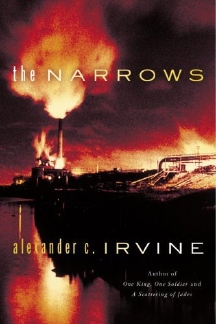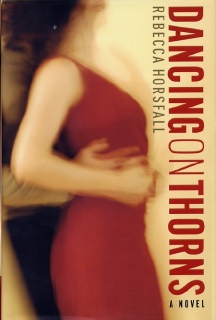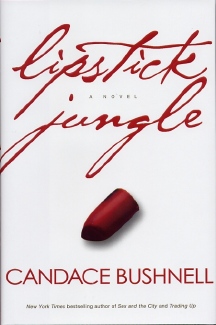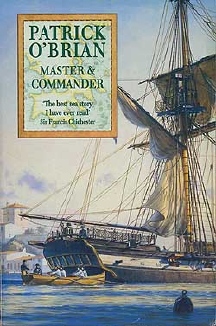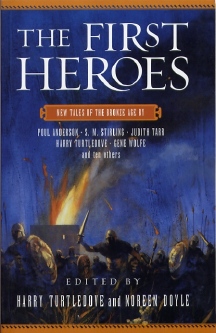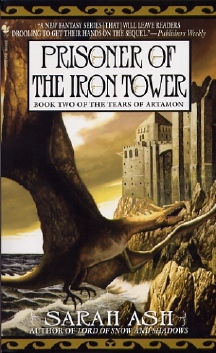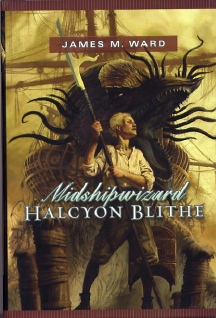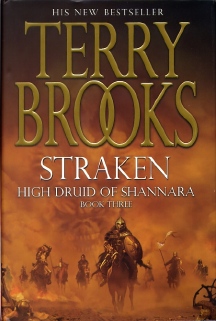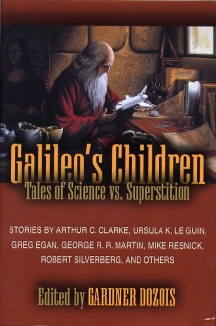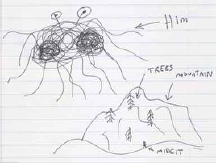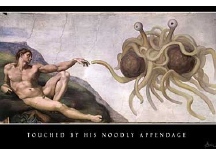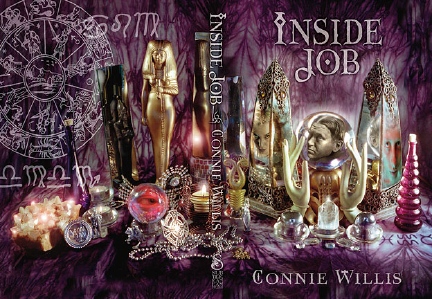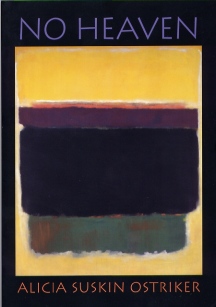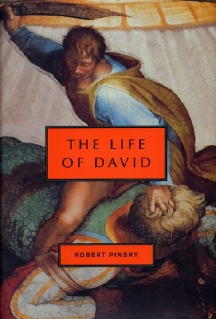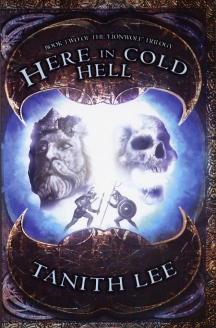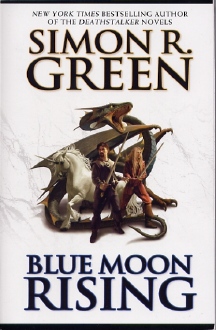|
|
|
This Just In...News from the Agony Column
|
09-02-05: Alexander Irvine's 'The Narrows' |
|||
Manufacturing
Magic in WWII
But I missed reading his follow-up, 'One King, One Soldier'. In part, I missed it because I tried to get a review copy but was never able to. And it proved difficult to find at my local bookstores and eventually got washed into the tide of titles I'd liked to have read but managed to miss. I do actually try to contribute books I suspect will be good to that tide, just to give myself something to read, "in the fullness of time," when for reasons that I can't guess, I'll have time to read my growing backlist. I will read 'One King, One Soldier', but apparently, not before 'The Narrows' (Del Rey / Bantam / Random House ; September 6, 2005 ; $13.95). Fortunately for me, Irvine writes stand-alone novels and novellas, like his quite wonderful bit for Subterranean Press, 'The Life of Riley'. 'The Narrows' looks as if it might be his best work yet, offering his signature combination of historical fiction and supernatural shenanigans combined this time with a bit of science fiction. Interestingly enough, it's coming out shortly after another long-awaited (by me) bit of historical weird fiction, Jeffrey Ford's 'The Girl in the Glass', which I'm reading and enjoying right now. Like 'The Girl in the Glass', 'The Narrows' will debut as a trade paperback original, which is...something of a disappointment to me. To my mind, both these authors, similarly talented and similarly inclined, deserve hardcover originals. But such is the life of the publishing world that they're relegated to trade paperbacks. I have to admit that it does rather affect my ability to enjoy a book. US trade paperbacks are not particularly well made, at least, compared to UK trade paperbacks, which seem to have the same type of paper and printing used in the hardcovers. But if the cheaper price gets it into the hands of more readers, then I'm all for it. I'm just not all that convinced that it will. But format, shmormat. Irvine's latest looks a treat no matter how I have to read it. I'd probably agree to wax tablets, and in Irvine's world, that might be the case. 'The Narrows' is set in Detroit during the 1940's, caught up in the midst of the war effort. But as you might imagine, this isn't exactly the Detroit we know. In 'The Narrows', Henry Ford is churning out golems to support our boys Over There. Jared Cleaves is Over There. He's Over Here, and Irvine's version of Here is every bit as forbidding as the trenches. In a Detroit frantic to keep up with the advances of German magic technology, Cleaves and his family find themselves battling forces bent on sabotaging Ford's line. Of course, though Irvine may be writing about a Detroit that never was doing things that were never done, his story is a wonderfully cracked mirror for our own fragmented world. "This is not a war of belief; it is a war of machines," laments the Rabbi responsible for the Golem manufacturing line. "The golem is a gift from God...What is this gift if other gods give gifts? I have made golems from anger; now I am no longer angry. I am without hope. This is a war for machines and men." Irvine's vision of a dark, mechanized America is powerful and compelling, and his prose once again shows him to be a major writer, somebody to be reckoned with. The problem with the whole trade for me is that he doesn't even have the chance to make the bestseller lists, and he surely deserves this, as does his contemporary Jeffrey (not Henry) Ford. These two writers are fabulists of the first rank. And in a world where Philip Roth can hit the bestseller lists with 'The Plot Against America', it seems to be that Irvine should at least be given a chance. With a dark cover and trade paperback format, there's no telling where they'll shelve this book. Will it end up with SF? Or will they stack it next to the rows of TPB fiction originals? What will the audience for non-fantastic fiction make of a book about the golem production line worker struggling in 1940's Detroit? Frankly, I think that if they managed to actually buy the book, they'd really flip for it. Hopefully those reading trade paperback original fiction will make the effort to pick up this one and Ford's latest. Damn the shelving! Ask someone who works at the store to help you find this if it's not where you expect it to be. Who cares what you call it or how you shelve it? Maybe we need a new genre to shelve material such as this; call it the Good Reading genre. It makes about as much sense as any of the other shelving genres out there. |
|
09-01-05: Rebecca Horsfall is 'Dancing on Thorns' and Candace Bushnell Rules the 'Lipstick Jungle |
|||||||||
Girly
Book Explosion
The first to arrive, and the one to describe itself as such, was Rebecca Horsfall's 'Dancing on Thorns' (Ballantine / Random House ; September 6, 2005 ; $23.95). Take a look at that price, because they're practically giving away this one; it clocks in at 786 pages of smallish type. Now normally, I might just pass such a tome by, but when it gets that big and sells for that little, then something is up. What's up is that we have another large book by a woman that was some ten years in the making. Last year -- was it only last year -- we had Susanna Clarke's gigantic novel 'Jonathan Strange and Mr Norrell' hit the shelves and the bestseller lists. It was ten years in the making and seven-hundred plus pages. This year, we've already had Elizabeth Kostova's 'The Historian'; not quite as long in pages or creation, but still, a big ol' novel. For me, both of those novels were attractive because they folded elements of genre fiction into literary fiction. Horsfall does this as well, but the genre she's folding in with her literary ambitions is the romance genre. Yes, 'Dancing on Thorns' is finely written, and yes it is an unabashed "Epic Romance". Published earlier this year in the UK, 'Dancing on Thorns' is set in the world of ballet. In this case, leading the dance is Jean-Baptiste St. Michel (the blur not wearing a dress on the cover), and swept away by his tripartite name is Jonni Kendall, a nineteen-year old wannabe actress. The DJ flap doesn't get to the word commit until the second paragraph. So nothing left for me, really, except ten years in the making and made in the UK. Still, I do like the prose, and when the publishers commit to a mammoth book like this at a low price like that, you know theyve got their hopes ratcheted up to the ceiling. I find it really interesting that they're touting the whole "Ten years in the making" aspect. Presumably, this is now, with Clarke and Kostova as backup, meant to be an indicator of quality. To me it suggests that if you take ten years to write your book, it'd better be pretty damn long. But here we are in the dawn of the twenty-first century, and a honkin' English romance about ballet dancers is getting top-drawer treatment just as the kiddies head back to school. I guess we know who the publishers think will have some time to spend in the bookstores.
Stalking the 'Lipstick Jungle' (oh, the puns one can get from this title are far too tempting, aren't they?) are Nico O'Neilly, editor of Bonfire magazine, Wendy Healy, president of Parador Pictures and (I'm not making this up -- she is!) Victory Ford, uh, Runway Model. No, Victory is NOT a forensic scientist drawn into a dangerous murder investigation, and for that, let us be thankful. Instead these three gals are no doubt acquaintances in New York. A random dinner scene has Wendy telling Victory, "My tits are hanging down to my belly button." And I thought that this wasn't a horror novel.
And even though I'm mercilessly making fun of these books, they're surely worth thinking about, even if youre only thinking that you should buy them for the other half. At least one business out there recognizes that half the audience is well, girls. And while both these books might as well say "NOT FOR MEN", well, think of how many books I write about here say "NOT FOR WOMEN". I'm guessing that somewhere out there in the Bookscan and Borders books databases, they've got numbers telling them that women buy books. Boy, time to write home, there's some news. Well, ladies, you now have your very own equivalent to books like 'The Gun Seller' and 'Death Rat!' I just hope that you enjoy 'Lipstick Jungle' as much as I enjoyed 'Death Rat!' I have to allow that 'Death Rat!' probably doesn't have the makings of a Showtime TV series. But if it does, I hope you'll give it a look-see. |
|
08-30-05: 'Galileo's Children' and FSM; Robert Pinsky's 'The Life of David' and Alicia Suskin Ostriker's 'No Heaven' |
|||||||||
Evolution
in Action!
But in the intervening months, that battle itself has evolved, an irony that might well be lost to those who are duking it out on the ground. In June, South Carolina State Senator Mike Fair (OK, the irony is not just lost, but buried), filed a bill that would require schools to expose students to a "variety of theories on controversial issues like evolution." Our own President echoed those sentiments. Well, sure, said Bobby Henderson, in an open letter to the Kansas School Board, the first state entity that had decided to get into the biz of teaching Intelligent Design. "Let us remember that there are multiple theories of Intelligent Design. I and many others around the world are of the strong belief that the universe was created by a Flying Spaghetti Monster." Illustrated thusly. And thusly is an Internet phenomenon born.
Since every religion needs its bestselling novels -- witness the growth of religious fiction as a genre unto itself, tracked unto itself by services like Bookscan -- then is it too much to hope that the millions now sporting FSM t-shirts and bumper stickers might spend a little of their disposable incomes on 'Galileo's Children', a collection of short stories that dramatize the collision of science and superstition? Not that I'm calling the FSM a superstition, mind you. I have too much respect for the beliefs of others to do so. And once you take the first step down the path of science versus superstition, you might want to follow that step with Connie Willis' superb 'Inside Job'. In this now sold-out novella from Subterranean Press, a channeler provides a path for the deceased and very skeptical H. L. Mencken. Mencken had his own run-ins with creationists back when he was covering the Scopes trial for the Baltimore Evening Sun; back then, he tartly remarked that the whole affair called attention dramatically to the fact that, "enlightenment, among mankind, is very narrowly dispersed." Many years later SF writer William Gibson would echo those sentiments when he said, "The future has arrived but it's just not evenly distributed." Indeed. But both 'Galileo's Children' and 'Inside Job' are easily obtainable if not evenly distributed. It's an evolving situation.
I will confess that the link between pirates and global warming seems a bit on the dubious side, however. But I will allow that my views on this and any other matter may evolve. |
|||||||||
Poetic
Double-Header
I've already finished the Ostriker collection, and I have to say that I enjoyed it more than I frankly expected to. In fact, it was downright excellent, enough so that I might have to explore this whole poetry scene a bit more extensively, if Ostriker's any indication of whats out there. Of course, back when dinosaurs roamed the earth -- at the same time I was going to college, which has some relevance to the article above -- I spent a fair amount of time reading poetry as an English major at UCI. So it's not like I'm a total stranger to it. But 'No Heaven', Ostriker's collection, was cleverly put together and beautifully, but not preciously written. The title is a reference to the John Lennon lyric from 'Imagine'. And yes, Lennon gets mentioned in a poem, but not as youd expect. 'A Walker in the City' is a tour of New York crime scenes; disturbing but generous. My guess is that readers of this column will need to read only that to get them to pony up for this book.
Meanwhile, Robert Pinsky, who gets a nod in one of Ostriker's poems, has a new biography out, 'The Life of David'. For a bit of sympatico and synchronicity, readers can read Ostriker's review of Pinsky's 'The Life of David' on the Jbooks.com website. In the glorious voice of a mythic storyteller -- "Of the Thousand Great Stories, more than a few are about him," it begins -- Pinsky rewires the lives of David into a single narrative and traces the fables, folklore and lessons associated with the slayer of Goliath. As a trickster, as a king, as a hero, David offers many faces and allows many interpretations. Pinsky approaches this subject not as an academic, but as a poet. It's a very odd little book, and it certainly might find resonance with those enjoyed the Bullfinch telling of Greek myths. Of course, the Greek myths were all about coincidence and the effect that chaos and the gods have on our lives. To help us evolve. |
|
08-29-05: Tanith Lee is Here in Cold Hell; Simon R. Green Stalks a 'Blue Moon Rising' |
|||
Book Two of the Lionwolf Trilogy
And here's where Tanith Lee get a big fat pass. Big and fat enough to make me want the first book in the series, and I have to admit that I've not been a big fan of Lee's up to this point. I mean, I've read her work in anthologies and enjoyed it, but no book until this one has commanded me to read it. But 'Here in Cold Hell' seems to have the volume turned up a bit on the normal anemic fantasy. In fact it seems turned up a lot, and in a manner that I find very appealing. Lee seems to have stripped out the fluff and the romance and played up the hard, mythic edges of her tale. You see, one of the appeals of reading fantasy is that I have been doing so since I was a little kid, when I voraciously read all of Bullfinch's Mythology and loved it. The monsters and gods in those tales were hard-edged and unforgiving. There were no maidens to soften things up in the end. There was a bleak plain splattered with blood -- the monster's, the hero's or both. 'Here in Cold Hell' gives me that same bleak vibe. The story in this second tome picks up with the hero Lionwolf in, well, a cold and icy hell, having been cast there by his true father, the god Zezeth. See what I mean? Very Greek-myth, that. Gods casting their kids into cold hells while hell breaks out on earth as well. Empires fall, magicians torment themselves, and the hatred of good ol' Zezeth is likely to spill over every damn where. Should you feel a need to experience some more mythic-based fantasy that's not very nice, then I'm certain you could get a good dose of cold, hard, unreality from Tanith Lee. I think the weather is very cold in this book, emotionally as well as meteorologically chilly. The gods are cold yes. But they're pretty damn entertaining. |
|||
Rewind and Reprint
With 'Blue Moon Rising', Simon R. Green takes the Terry Pratchett approach to fantasy, lampooning the fantasy clichés even as he adheres to them. You've got the unfortunately named Prince Rupert, the official Heir To the Etc. Etc. Which translates to second son of a piss-poor king in a destitute kingdom. Not an auspicious start. So he's off to kill the dragon and rescue a princess. The problem is that the dragon proves to be friendly. And the forest though which he has journeyed has coughed up darker dangers than the dragon which needs no slaying. In fact, the dragon's going to have to help him keep his keester out of the fire. So, knowing this is Simon R. Green, and we've got a reprint in TPB for, well, I'm quite interested. The cover is nicely illustrated, nicely done in a sort of matte printing and only moderately sleazy with the usual dragon, prince, princess and -- UGH -- unicorn. Then I open up the book. The paper's not a lot better than newsprint, and the type isn't either. So instead of automatic interest in a book I don't know I want, I find myself sort-of willing to buy a book I know I would like. Weird, ain't it? I mean in a published package like 'Here in Cold Hell' this would be an auto-buy in a heartbeat, but with this quality of printing, I'm forced to think, well...it won't kill me if I get salsa on the pages while eating lasagna for lunch in Kianti's in downtown Santa Cruz. Now that's a good consideration, and yes, I like the idea of a read-it-and-eat-and-not-weep-when-the-pasta-hits-the-page book. But I like it better when both the book and content inspire book lust. I guess that given the current economics of publishing here in the states, the idea of getting a book like Lee's is itself something of a fantasy. |
